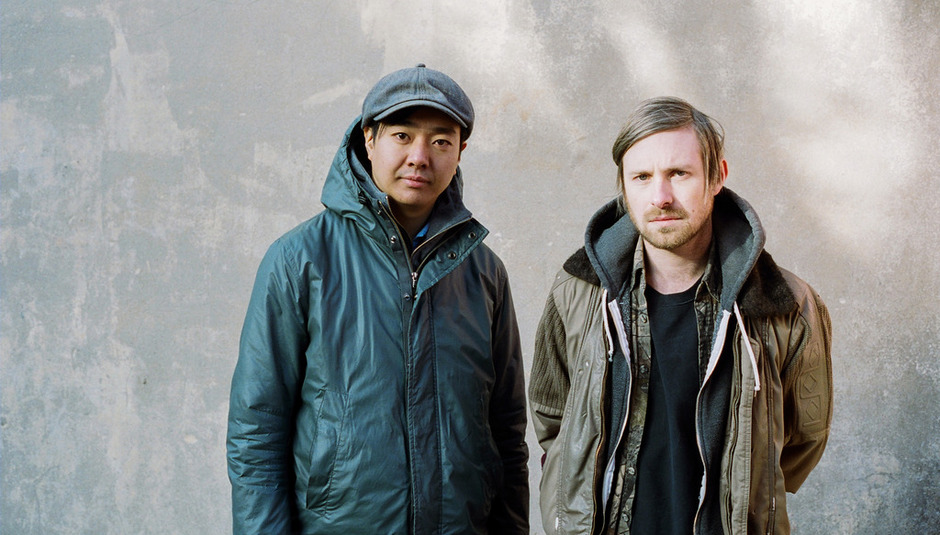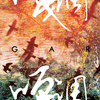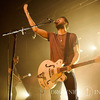Andrew Hung and Benjamin John Power of Fuck Buttons don’t seem to realise, but we’ve done this before. Back in September 2009, we sat down in a hotel lobby one week before Tarot Sport’s release and their first headline European tour. We talked about working with Andrew Weatherall, giving up their day jobs, and their thoughts on file sharing. It was only my second interview ever – I was surprised their management had even replied to my email, never mind said yes – and, predictably, it wasn't very good (thankfully, it’s no longer online). Despite, or perhaps because of, my nervousness and the brevity of my questions, they were unfailingly polite and courteous, giving a thoughtful response to each inane enquiry.
They were also electric that night, huge slabs of pristine, playful noise rising up and crashing down repeatedly, full of abrasive percussion and swirling atmospherics. It was an intensely physical experience that demanded attention, their set earlier that year at Primavera Sound still being the loudest thing I’ve ever heard. They took this apocalyptic soundtrack around the world for almost two years, before retreating back to the studio to work on the follow up. Slow Focus finally landed in July and, it’s safe to say, was well worth the wait.
Four years on, what’s interesting is how they’ve developed and their standing among music fans; it’s like they’ve never been away. Such gaps are often fatal, particularly for bands who aren’t exactly mainstream, but the complete lack of new material – there were no one-off singles, EP’s, or interesting B-sides – only seemed to heighten anticipation for an eventual return. And then, of course, there was the Olympics. Of all the music chosen by Danny Boyle for his spectacular opening ceremony, their inclusion seemed to cause the most surprise, pride, and discussion. “Is that…? No, it can’t be! It is! They’re playing Fuck Buttons!” Unwittingly, in an instant they became the lightening rod for the debate that difficult, underground music could be accepted and embraced by the public at large.
I wanted to ask about this, and how they felt being the focus of something they had no control over, but as they’ve already had to answer every conceivable query related to London 2012, I decide against it; this time, I have to do them justice. This time will be different.
DiS: Andrew, I read in some of your interviews that you still hate playing live. Is that true?
Andrew Hung: No, I don't hate playing live! It's not true at all.
So it's a complete misquote?
AH: Yeah, I think it is.
Benjamin John Power: More that you were anxious, I think. I do remember that interview.
AH: I was saying that Ben plays better than I do, I feel. He's a bit more comfortable on stage. It's more of a conscious effort for me, but I still enjoy it.
How did it feel before you went on stage at Glastonbury then?
BJP: It was exciting. I'd never even been to Glastonbury before, so to be able to go, and play, and my tent not be swept away by mud and whatever else comes with it, was good. Really exciting.
How do you think the show went?
BJP: It went really well.
AH: I can’t really think what to say about that, it was so long ago.
BJP: There was obviously a level of apprehension, to do with the fact that we were clashing with both the Rolling Stones and Public Enemy – more so the former – and our stage was a little bit further out. It was the Park Stage, which is up a hill, kind of on the edge of the festival. So we weren't too sure what the turnout was going to be, and just before we came on there was maybe about ten people in this huge field. But in the end, it filled out quite nicely, and it was a really great experience. We had a great time.
When did you realise that you were going to be up against the Stones?
BJP: It was after we agreed to play I think. Our manager turned round and said: "You know who you're clashing with, don't you?" And we hadn't heard that the Stones were playing, so he told us they were headlining the Saturday night and we'd probably be playing the same time as them. There was a slight level of worry, obviously; the biggest rock'n'roll band in the world is not an easy one to compete with, but it actually worked out really great.
With the live show now, is it still pretty much all "live"? How much, if at all, do you rely on loops and samples?
AH: There are a lot of loops and samples, yeah, but it is all "live"!
BJP: Any loops or samples that we use are used in a live sense. For example, they are the first signal in a long line of pedals that are manually manipulated, so whatever the signal processor maybe, whether it be a sample, a keyboard, or a loop, they are affected in a very live sense; the pedals are used as instruments just as much as the actual instruments are in the first place.
Given that you write and record "live" as well, how much scope do you have to alter the songs when you play live? Do you play around with them a little, or try to be quite faithful?
BJP: Bearing in mind the nature of the instrumentation we use, it would be very, very hard to 100% replicate the exact sound of something on record in a live sense. Obviously we have an understanding of the schematic so we can replicate it, but it's always going to be a little different.
How far do you actually want to go with regards to replicating it, and how much do you think the live show should exist separately from the recording, and be it's own, unique thing?
AH: It's not a replication. The recording is the next step from the writing, and what we play on stage is the writing, if that makes any sense. There are things that we bring back in from when we recorded it, but pretty much the whole song, and the way we play it, remains intact from before we recorded it.
It's been said many times that your material would be perfect for films and soundtracks; how come it hasn't happened yet?
BJP: I think our music has been used in certain things; it's been in a couple of trailers, and the Olympics of course...
But I meant for an entire project, à la Anthony Gonzalez and Oblivion. Like "I've got this film, can you do all the music?" type requests.
BJP: Well, that's a matter of time, isn't it? That's a matter of how many hours there are in a day. We've been very, very busy; we put out two albums several years ago, and they were just a year apart, then we toured a lot, and then we started to write for this record. So we haven't really had time to work on something, like a project that big, so when we do...
AH: Plus, we've never been asked! [laughs]
That surprises me.
AH: Well, we've always wanted to, but we just haven't been asked, have we? That's true, isn't it? Or have we?
BJP: I don't think we've been asked.
AH: I mean, we don't have the time. Like Ben said, we've been so busy, but it is something that we'd both love to do. I imagine we’d be really picky too, if we did get asked. Because both of us like films, and we're both visual artists anyway, so we both have very particular tastes in that field. So I imagine because of the time restraints, and also our taste restraints, it would take very specific circumstances for us to do something like that. Don’t you think Ben?
BJP: Yes, I agree!
So it couldn't be any old Hollywood blockbuster?
AH: I don't think so. Well, I don’t know; it's all quite hypothetical at this stage, isn't it? We'd do ET, for instance. It's not like we'd only do arty films or whatever, it would just be a specific aesthetic that we'd look for – science fiction would be right up there, but I can't imagine us doing something like Anchorman.
I would see your material being the perfect foil for some strange, dystopian, disaster film, or something like the new Robocop reboot.
BJP: Yeah, that could work. That would be amazing!
AH: I don't know too much about the new Robocop. But it's like, there have been two Judge Dredds and neither of those were great. And they weren't even in line with what the comics were about, at least in my opinion.
I saw the first one with Sly Stallone at the cinema in 1995, and I remember it being not very good. But the new one was supposed to be quite cleverly done, at least with the effects and the cinematography.
AH: But Judge Dredd needs to be quite camp, like the comics.
Making superheroes dark and moody is all the rage though. You had Batman, Spiderman, now even Superman...
AH: They're not dark enough though, are they? They need to start murdering people or something.
BJP: There's plenty of murder in superhero movies, isn't there?
AH: Batman needs to kill people.
There was some extraordinary rendition in The Dark Knight Rises...
AH: He breaks someone's legs as well, doesn't he? Pushes them off a building or something. OK, that's quite dark.
But is soundtracking a film or project like that something you can actually pursue? Like, letting people know, or putting it out there, that you're open to offers and want to do something like that?
BJP: It is something that you can pursue I think, if you have enough time.
AH: You can pursue anything, if you want to.
Listening to Slow Focus, it's a weightier, more intense listen in places than some of your earlier material, and it feels like the more euphoric elements have been replaced by something a bit darker, and with a bit more texture. What were you listening to, or what were you inspired by when you were making it that seeped into it and made that change.
AH: I think the music itself has momentum. We don't really look to outside influences at this juncture in our...not career, that's not the right word, but the path of the music. It's got it's own mentality now, the music, and we're kind of just people who guide it. Each album informs the next one, and I'm sure Tarot Sport did that to Slow Focus – I'm not sure why – but we don't enter into the music with any design in mind. We want to just enjoy the experience – that's all we do – and for some reason it became this thing that you've just described. But I couldn't tell you why.
James Holden was recently quoted in an interview as saying that "Ableton is only two steps up from guitar hero"...
AH: [Laughs heartily]. Really? Where did he say that? Was that recently?
Yeah, it was last week. It was in an interview with Rock Feedback.
BJP: And what did he mean by that?
I think his point was that it's too easy to make music these days, and by using Ableton you were "cheating" as it were, or taking a short cut.
BJP: I don't think I agree with that...
AH: I asked Luke Abbot about this, because ages ago he [James] said something similar. I said: "So James doesn't like Ableton?" and he said: "No, I actually got him to get into Ableton quite recently, and now he's into it." And now, so a couple of weeks ago he's saying he doesn't like it again?
Well, that was the pull quote from the interview that was all over Twitter and Facebook for a day or two.
AH: I know he's gotten into those modular synthesisers over the last couple of years or so, and they are a lot of fun. It's very physical, and I can kind of see what he's saying about Ableton because it's like Garage Band; you can make a track within two minutes of opening it up, and it is very easy. But it's a tool...
BJP: But isn't that what people said when 4-tracks first came out? I don't necessarily agree with that. It's peoples’ ideologies that are ultimately going to create good music, not the process, and I think that just sounds like a bit of snobbery to be honest.
AH: I think he's just saying that...I don't agree with it either, but from the sounds of it, he needs some kind of impetus to be more physical with his music.
BJP: If that's his agenda, then that's totally fine. There's nothing wrong with it. I don't think it really matters how you achieve your goal, necessarily. As long as you achieve what you set out to do in the first place then hat's off to anybody and everybody who tries in the first place.
AH: We are in an age where making music is incredibly easy – not good music, by the way, but just making music – and this means there's a lot of crap out there. That's just a by-product of the technology that we have, and that's not a bad thing. There is a lot of noise, in every kind of aspect of social media and stuff, but wading through it is just another skill set that you're going to have to acquire.
I was thinking about when you guys first started, and there really weren't that many acts or bands who dealt in electronic soundscapes and drones, or who were producing very textured compositions like you do. But over the last couple of years, it's exploded, and it seems that everyone wants to be an electronic producer now. Is it just down to the cheapness and availability of technology, or is there something else going on?
BJP: I think there's more of a focus on producers nowadays, rather than musicians, as there was maybe ten years ago. That probably plays a big part in it – being a producer now is the pinnacle.
AH: I think your point is partly to do with it, and Ben's right as well. I do draw parallels between where we are at the moment with what music was like twenty years ago. Music comes and goes in fashion; for instance, to me dubstep sounds like drum'n'bass from the late 1990's, and that new kind of dark, electronic that we're hearing a lot at the moment sounds like trip hop to me, from the early 2000's. I'm pretty sure guitar music will come back in in a few years time as well; guitars have been so popular for the last 70 years or whatever, and it's because they transfer the emotion of the performer so...easily. That's why Ableton is so difficult; in all music you want to translate your emotion to it, and because it’s so easy to make music with Ableton it's actually harder to transfer that emotion. But with guitar, I think that's why it was so popular, even back then. I don't know why I'm talking about this actually...
It's an interesting theory.
AH: I don't really listen to much guitar music – just once in a while – but when I do, what always instantly hits me is how I can hear the blood and sweat and tears of the person who's playing very quickly.
There was big gap between Tarot Sport and Slow Focus; is it going to be another four years before we hear some new material?
BJP: Who knows? I think if we had to start working now...we'll see what happens after this string of dates. We like to keep ourselves busy, but we're not going to put something out half arsed.
But do you have any concrete plans or dates in place for the New Year, to take the next step?
BJP: I imagine next year there's probably going to be a bit more touring, you know? We've spent two months touring Slow Focus, and there are plenty of places we missed out this time that it's only fair that we visit next time. So I imagine after that we'll sit down and break out the equipment, and start thinking about other things.
Some more festivals as well?
BJP: I'd imagine so.
AH: Definitely. We didn't play that many festivals this year; we played a few, but I think we'd like to play more. If we're asked.
Slow Focus is out now on ATP Recordings.






















